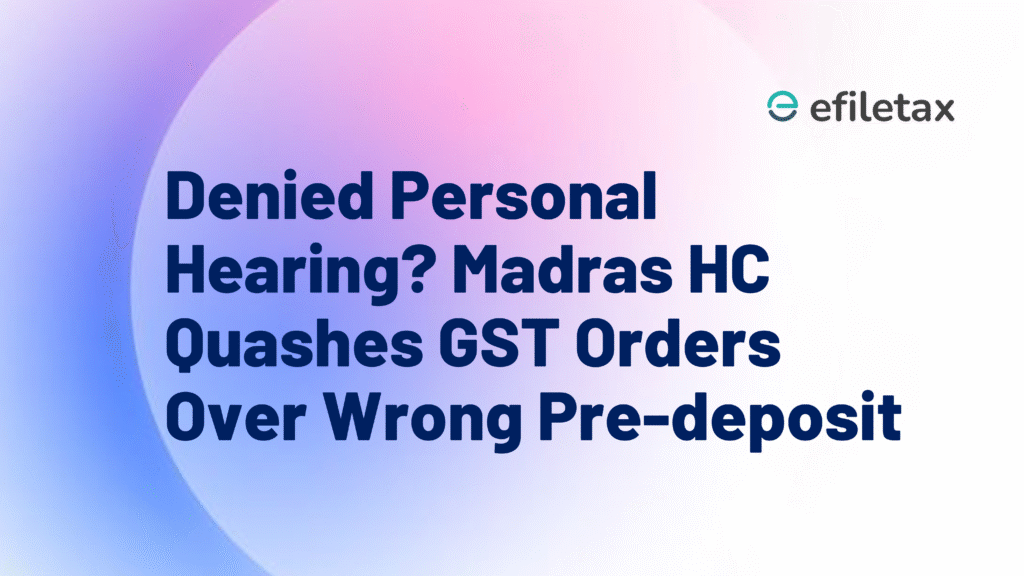
Summary
The Madras High Court struck down GST orders passed under Sections 73 and 74 for denying personal hearing and allowing only a 10% pre-deposit instead of the mandated 25%. This judgment reinforces taxpayer rights and procedural fairness in GST adjudication.
Introduction
GST personal hearing denial is emerging as a critical ground for challenging assessment orders under Sections 73 and 74 of the CGST Act. A recent Madras High Court ruling has spotlighted this issue, setting aside multiple orders that skipped mandatory hearings and wrongly accepted a 10% pre-deposit instead of the required 25% under Section 107 for appeals.
What Triggered the Court’s Intervention?
In multiple writ petitions, taxpayers challenged GST demand orders passed under Sections 73 and 74. These orders had two major flaws:
- No opportunity for personal hearing, violating principles of natural justice and Section 75(4) of the CGST Act.
- The pre-deposit was limited to 10%, not the statutory 25% required to file an appeal under Section 107.
The department justified this based on internal circulars or system-generated notices. But the Court clarified that statutory provisions cannot be overridden by administrative practices.
Key Legal Provisions Cited
| Provision | Legal Content |
|---|---|
| Section 75(4) | Mandates personal hearing if requested or adverse decision is likely |
| Section 107(6) | Appeal requires 10% pre-deposit of disputed tax + additional 20% if relief is sought against order passed under Section 129 |
| Article 226 of Constitution | High Courts can quash orders violating natural justice |
Highlights of the Madras HC Judgment
- Violation of Natural Justice: Not granting a hearing despite request made the order invalid.
- Section 75(4) is mandatory, not discretionary. If a taxpayer requests a hearing, it must be granted.
- Quashed demand orders as they were passed without compliance to mandatory procedure.
- Warned against mechanical or system-generated assessments bypassing law.
Case Reference: W.P. Nos. 14937, 14941, 14943 of 2024 – Kavitha Traders vs State Tax Officer (Madras HC)
Expert Insight
Tip for Taxpayers:
Always submit a written request for personal hearing while replying to GST notices under DRC-01 or SCN. If the hearing is not granted and a demand is passed, you can challenge it under Article 226 citing violation of Section 75(4).
Pre-deposit Confusion: 10% vs 25%
| Scenario | Pre-deposit Required | Section |
|---|---|---|
| Normal Appeals | 10% of tax in dispute | Section 107(6)(b) |
| If order passed under Section 129 (Detention/Seizure) | Additional 20% | Proviso to Section 107(6) |
| Common Error | Some officers apply only 10% rule, even under 74, causing rejection of appeals |
The Madras HC clarified: A minimum of 25% (10%+15%) is needed in cases involving Section 74 to admit the appeal.
Practical Impact on Businesses
- Many taxpayers fail to get a hearing and don’t realise it can be grounds to quash the order entirely.
- Filing an appeal without the correct 25% pre-deposit often leads to rejection.
- This ruling now strengthens the grounds for judicial remedy under Article 226.
What Should You Do If You’ve Received a GST Order Without Hearing?
- Review the order and check if personal hearing was granted.
- Check your SCN reply—did you request hearing in writing?
- If denied, file a writ petition in your jurisdictional High Court.
- Ensure correct pre-deposit is made before filing appeals under Section 107.
Internal Link Suggestion
👉 Also read: How to File GST Appeal under Section 107 – Step-by-Step Guide
External Link
Refer to CGST Act, 2017 – Section 75(4) for official wording.
FAQs
Q1. Can a GST order be challenged if no personal hearing was given?
Yes. Under Section 75(4), hearing is mandatory. High Courts have quashed such orders.
Q2. What is the correct pre-deposit for appeal under Section 74?
25% of the disputed tax—10% + 15% under proviso to Section 107(6).
Q3. Can I get refund of pre-deposit if I win the appeal?
Yes, the deposited amount can be claimed as refund if the case is decided in your favour.
Conclusion
The Madras HC ruling is a wake-up call for both taxpayers and GST officers. Procedural compliance isn’t optional—it’s fundamental. If you’ve received a GST order without a hearing or with incorrect pre-deposit instructions, don’t ignore it. Legal recourse exists.
Need help filing an appeal or understanding your rights?
👉 Get expert GST support from Efiletax today.